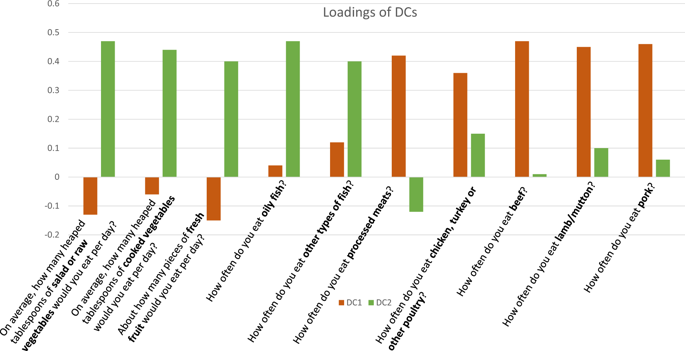当前位置:
X-MOL 学术
›
Transl. Psychiaty
›
论文详情
Our official English website, www.x-mol.net, welcomes your
feedback! (Note: you will need to create a separate account there.)
Genome-wide association study of dietary intake in the UK biobank study and its associations with schizophrenia and other traits.
Translational Psychiatry ( IF 5.8 ) Pub Date : 2020-02-03 , DOI: 10.1038/s41398-020-0688-y Maria Niarchou 1, 2, 3 , Enda M Byrne 1 , Maciej Trzaskowski 4 , Julia Sidorenko 1, 5 , Kathryn E Kemper 1 , John J McGrath 6, 7, 8 , Michael C O' Donovan 2 , Michael J Owen 2 , Naomi R Wray 1, 6
Translational Psychiatry ( IF 5.8 ) Pub Date : 2020-02-03 , DOI: 10.1038/s41398-020-0688-y Maria Niarchou 1, 2, 3 , Enda M Byrne 1 , Maciej Trzaskowski 4 , Julia Sidorenko 1, 5 , Kathryn E Kemper 1 , John J McGrath 6, 7, 8 , Michael C O' Donovan 2 , Michael J Owen 2 , Naomi R Wray 1, 6
Affiliation

|
Motivated by observational studies that report associations between schizophrenia and traits, such as poor diet, increased body mass index and metabolic disease, we investigated the genetic contribution to dietary intake in a sample of 335,576 individuals from the UK Biobank study. A principal component analysis applied to diet question item responses generated two components: Diet Component 1 (DC1) represented a meat-related diet and Diet Component 2 (DC2) a fish and plant-related diet. Genome-wide association analysis identified 29 independent single-nucleotide polymorphisms (SNPs) associated with DC1 and 63 SNPs with DC2. Estimated from over 35,000 3rd-degree relative pairs that are unlikely to share close family environments, heritabilities for both DC1 and DC2 were 0.16 (standard error (s.e.) = 0.05). SNP-based heritability was 0.06 (s.e. = 0.003) for DC1 and 0.08 (s.e = 0.004) for DC2. We estimated significant genetic correlations between both DCs and schizophrenia, and several other traits. Mendelian randomisation analyses indicated a negative uni-directional relationship between liability to schizophrenia and tendency towards selecting a meat-based diet (which could be direct or via unidentified correlated variables), but a bi-directional relationship between liability to schizophrenia and tendency towards selecting a fish and plant-based diet consistent with genetic pleiotropy.
中文翻译:

英国生物银行研究中膳食摄入量的全基因组关联研究及其与精神分裂症和其他特征的关联。
受观察性研究报告精神分裂症与不良饮食、体重指数增加和代谢疾病等特征之间的关联的启发,我们在英国生物银行研究的 335,576 名个体样本中调查了遗传对饮食摄入的影响。应用于饮食问题项回答的主成分分析生成了两个成分:饮食成分 1 (DC1) 代表与肉类相关的饮食,饮食成分 2 (DC2) 代表与鱼类和植物相关的饮食。全基因组关联分析确定了 29 个与 DC1 相关的独立单核苷酸多态性 (SNP) 和 63 个与 DC2 相关的 SNP。根据超过 35,000 对不太可能共享亲密家庭环境的三级亲属对进行估计,DC1 和 DC2 的遗传力均为 0.16(标准误差 (se) = 0.05)。 DC1 基于 SNP 的遗传力为 0.06 (se = 0.003),DC2 为 0.08 (se = 0.004)。我们估计了 DC 和精神分裂症以及其他几个特征之间的显着遗传相关性。孟德尔随机分析表明,精神分裂症的易感性与选择肉类饮食的倾向(可能是直接的或通过未识别的相关变量)之间存在负单向关系,但精神分裂症的易感性与选择肉类饮食的倾向之间存在双向关系。鱼类和植物性饮食符合遗传多效性。
更新日期:2020-02-03
中文翻译:

英国生物银行研究中膳食摄入量的全基因组关联研究及其与精神分裂症和其他特征的关联。
受观察性研究报告精神分裂症与不良饮食、体重指数增加和代谢疾病等特征之间的关联的启发,我们在英国生物银行研究的 335,576 名个体样本中调查了遗传对饮食摄入的影响。应用于饮食问题项回答的主成分分析生成了两个成分:饮食成分 1 (DC1) 代表与肉类相关的饮食,饮食成分 2 (DC2) 代表与鱼类和植物相关的饮食。全基因组关联分析确定了 29 个与 DC1 相关的独立单核苷酸多态性 (SNP) 和 63 个与 DC2 相关的 SNP。根据超过 35,000 对不太可能共享亲密家庭环境的三级亲属对进行估计,DC1 和 DC2 的遗传力均为 0.16(标准误差 (se) = 0.05)。 DC1 基于 SNP 的遗传力为 0.06 (se = 0.003),DC2 为 0.08 (se = 0.004)。我们估计了 DC 和精神分裂症以及其他几个特征之间的显着遗传相关性。孟德尔随机分析表明,精神分裂症的易感性与选择肉类饮食的倾向(可能是直接的或通过未识别的相关变量)之间存在负单向关系,但精神分裂症的易感性与选择肉类饮食的倾向之间存在双向关系。鱼类和植物性饮食符合遗传多效性。











































 京公网安备 11010802027423号
京公网安备 11010802027423号